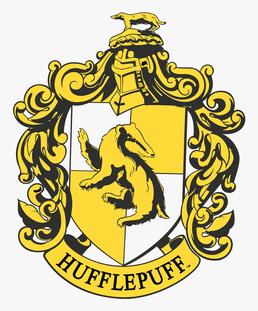 It’s no secret that I love Harry Potter. And if you know anything about me, this should come as no surprise. I'm a little nutty about it, obsessed even. I’ve read the entire series five times through, and each time, I get swept up in the magic of the story. The books continue to teach as much as they engage, even after all this time. Harry Potter 101 for you non-fans: Hogwarts is a magical school that trains wizards. Students are sorted into one of four houses, each named for their founders and exemplifying traits that those founders valued in their students: Gryffindor took the brave and chivalrous, Ravenclaw took those who were intelligent and witty, Slytherin took those of cunning and ambition, and Hufflepuff valued patience, kindness, and hard work, but pretty much just took the leftovers. If I’m entirely honest, I identify most with Slytherin house, with strong streaks of both Gryffindor and Ravenclaw. I’m cunning, I’m bold, and I’m pretty smart. But I have never, ever identified with Hufflepuff. Not even a little bit. My own sister has called me a “loveable asshole,” and my husband can attest to the nature of my (slightly improved, but still not great) patience. But life keeps calling me to act in very Hufflepuff-like ways. My first teaching job was at a school that welcomed those on the fringes, a school whose open enrollment was among the highest in the state. An impressive statistic, for sure, but this open enrollment came at a price: these kids were society’s “leftovers.” These were kids who had been expelled, who had flunked out of other schools, who posed some pretty significant behavior problems. Other area schools simply did not want them. When I was in college, I envisioned myself teaching only AP Literature courses to only a handful of exceptional, chosen students. I saw myself giving lofty, pretentious lectures on the Victorian British poets while my students scribbled pages of notes they could use to regurgitate my own thoughts back to me in a perfect five-paragraph essay. (Seriously, I expected this to happen.) I wanted a room full of Ravenclaws and Slytherins—intelligence and ambition, fighting it out for the top marks. What I got instead was a bunch of Hufflepuffs. That is not to say that I didn’t have exceptional students, because I did. I encountered kids whose talent with words was equal to/greater than my own, whose IQ’s were in the 140’s, who went on to become doctors and lawyers and engineers. But the gap between the high and the low was vast, and for every excellent student I had, I had two or three who couldn’t be bothered to finish the work I assigned, regardless of ability. (One boy—IQ 140—often took worksheets straight from my hands and threw them directly into the trash.) So instead of intelligence, valor, and cunning, I began to value hard work, and this completely changed my focus as a teacher. I decided to reward effort over outcome, because intelligence without application is worthless, and being willing to try is the first step to greatness. So I pivoted, and I made my classes easy. (Which went against every pretentious inclination I’d had at the beginning of my career.) I stopped giving homework altogether. I focused on practical skills and their application. I taught very basic things, and we did a lot of the work together as a class. We read the Victorian British poets, sure, but I focused the majority of my reading curriculum on basic comprehension—a life skill that literally everyone will use. In hindsight, I see the wisdom in this decision. (Show me one adult without an English degree or a literary fixation who analyzes Victorian British poetry in their free time…) Instead of giving a single, coveted A to one outstanding student per semester as I’d initially planned, I found myself promising passing grades in exchange for simple, genuine effort, and I only ever failed kids who did not complete their work. I gave so, so, so many D— ’s. (Not quite failing, but oh-so-close.) But those guaranteed passing grades were getting kids to readdress their failure mindsets, and suddenly, they were more willing to try. I embraced the challenge they posed, embraced them, and I fell in love with the idea of finding ways to reach them where they were. Society is so much better off when the kids who aren’t exceptional or gifted are given a chance to thrive, even if the victories seem insignificant. (And a worksheet with answers written on it is better than one thrown directly into the trash can, regardless of ability level.) I don’t teach anymore, but I still work with kids. As a foster mom, I have had to become a champion for inclusivity. I work even more closely with children who have been rejected, who face unimaginable mental health challenges, who struggle with school and socialization, who require special services for success. I embraced my leftover kids. I’ve given them a place to belong. I’ve called them mine, and I love them. Just call me Mother Hufflepuff.
0 Comments
Your comment will be posted after it is approved.
Leave a Reply. |
Old Stuff.
January 2023
Categories.
All
|
 RSS Feed
RSS Feed


